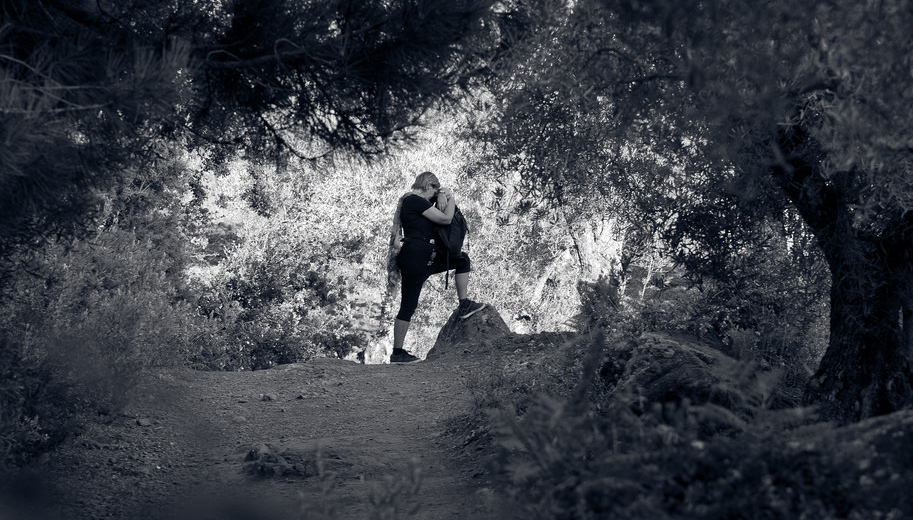I thought I was going to die.
Or that I was going to faint and collapse, at least.
It was a slightly chilly morning in early spring, and I was staring at the ground in front of me, taking small steps forward.
“You can do it,” the troop leader cheered on.
Inside, I was shaking my head, wondering how I got suckered into self-portaging a canoe…for a mile of rocky forest road, going uphill and downhill amongst tree roots. Also, I wanted to murder her.
Meanwhile, everyone else was portaging canoes in groups of two or three.
How the hell did I get myself into this?
I picture that sunny, picture-perfect day. The sunlight gleamed gently through the trees, breathing life into the sparse forest with skinny trees and short ferns.
Further out was the glistening lake water, reaffirming the brightness of the day. This was one of those days that you look back on while you sit in a room, or your office, and sigh wistfully.
Except I was in my own hell.
When you first lift a canoe onto your shoulders, it really isn’t so bad. Anyone can do it! You can take a step forward easily, maybe even a few steps.
But after awhile, the turmoil begins. The heaviness of the canoe begins to weigh on you as you take each step. Add to that, going uphill on a bumpy trail and some tree roots here and there. Being in my early teens at the time, this seemed incredibly crazy.
As I carried the canoe above my head, I could feel it pushing against me, wanting me to collapse underneath its heavy weight.
But the troop leader kept pushing me. “Just keep going. Keep going.”
Easy for you to say, I thought.
But I persisted. One step at a time. I figured that if I just took one step forward, then another, and yet another…I would make it.
I couldn’t see how far I had gone, nor how close I was to the destination. I just knew that I had to move forward. Every step would bring me closer to getting this weight lifted off.
And finally, the moment had arrived. “We’re here.”
As I put down the canoe and rested on the nearest tree log, I was convinced the troop leader was insane. Equally as bad was the person nearby complaining of stomach aches. As if that could compare to the torment I had just been through!
Well, it’s been awhile since that experience, and I’ve gained some perspective.
Here’s the insight I’ve gained:
1. We expect too little from ourselves.
If someone had told me that I would portage a canoe on rocky, bumpy trails by myself that day, I wouldn’t have believed them. I just couldn’t.
But I did.
How many times have you looked at something, or what someone else was doing, and just thought to yourself, “Good for them. I could never do that.”
It’s just not worth it. Maybe it’s the fear of wasting time, energy, or failing ourselves that prevents us from even trying something in the first place.
And as we get older, we bother less. Our accumulated failures condition us to believe that any risk just isn’t worth taking. We convince ourselves that everything is fine as is.
Except, we later start to feel the tingling of regret. We start to wonder what could have been, if we had just pushed ourselves that extra bit.
The problem is that we naturally veer towards the status quo. It’s comfortable. Even moreso, it’s almost even expected of us by families and friends. As soon as we try something new, people say things such as, “Why do you need to do that? You’re fine as you are.”
Ask yourself: “What if?” What if you tried something? What would be the worst that could happen?
Sure, there’s risk involved in anything new, but there could also be massive rewards.
These rewards might not be something concrete, such as money. It could be something like gaining a new sense of what we can accomplish, or seeing the possibilities before ourselves.
Consider the long-term effects of your decision. If you decided not to do something, would this become a regret that you look back on years, or even decades later?
Almost always, the things worth doing are the hardest. And if you never even gave it a try, you’ll be stuck wondering what could have happened.
2. Strength is mental as much as it is physical.
I used to think that being the best at something meant simply that you practiced all the time. Just like how being a fast runner means you need to be a) a naturally fast runner, and b) constantly practicing. Put those together, and you become very fast.
This is only one part of the equation though. Have you ever looked at someone who had achieved something and thought, “Wow, I wish I could have done something like that?”
The person makes it look so effortless and easy, whether it’s social skills, running a business or getting physically fit. Maybe they’re an “overnight success”.
But underneath the success are the years of hard work. Grueling practice, mistakes and failures to get to where they are.
So often, we just look at the end result without considering the entire process. It takes work to mentally be able to dedicate time and effort into something.
Getting into the right frame of mind is what keeps people from physically just stopping and giving up. This requires training your mind to stay resilient, even when things get tough and there is uncertainty.
Becoming stronger mentally can also mean getting someone else to be accountable for your success. This person could be a coach, a mentor or a friend who has similar goals. Together, you can push each other past what you thought were your boundaries.
At the time, I thought the woman was insane for making me self-portage a canoe like that. But if I were to cross paths with her today, I would say, “thank you.”
Have you had someone push you to do more than you thought possible? How did you feel about it then, and how did you feel in the end?
Photo by Hernán Piñera






Hi Melissa
I agree with all your points and you are right from the top to the end. I imagine how you must have felt while in the canoe. Hmm what an interesting experience.
The temptation to be like one without being prepared mentally for the work is not new but I agree that one needs to work hard and believe in himself to achieve success. Thanks for sharing.
Thanks ikechi for your comments. Isn’t it funny how we remember things from so long ago?
Yes, believing in oneself is important. I think it’s equally important to have others believe in you, which means surrounding yourself with people who encourage you to work on your endeavors.
You’re absolutely right with your second point; I sometimes joke that I’d eat more after sitting all day doing paperwork than after going out there to do fieldwork.
It may work for you, and you should definitely thank your mentor for it–if they really know what they’re doing and you already have a long term goal, with which the grueling experiences are part of reaching that goal. You should know who you would listen to.
I think there’s a problem if we get “attached” to someone in our life–they could be our parents, friends, or simply the people around us, and tend to believe everything they say. We may not notice it but some of them will actually teach us to be on the safe side. Their support is great; the love is incredible. But sometimes, they’d just tell you–or show you–just exactly how to be safe and not do the extra mile every day.
All this realization would be possible, of course, if you can think well for yourself.
This article is great. All I’m saying is being a bit more careful wouldn’t hurt.
Thanks for sharing your insights, Melissa!
Ethan, I definitely agree that most people around us – parents, friends, etc – encourage us to be “safe”. Not to take risks. I think it’s because humans naturally don’t really welcome change and we get stuck in the same old habits and comforts, so that anything new or unusual makes people very uncomfortable.
Of course, like you said, being careful is important too in all aspects of life – which is a calculated risk is best. For example, don’t just quit your job without savings to start a business…it may work out, or you could end up broke. Rather, implement change slowly and take the leap when there’s greater certainty of success.
Thanks for sharing your insight Ethan!